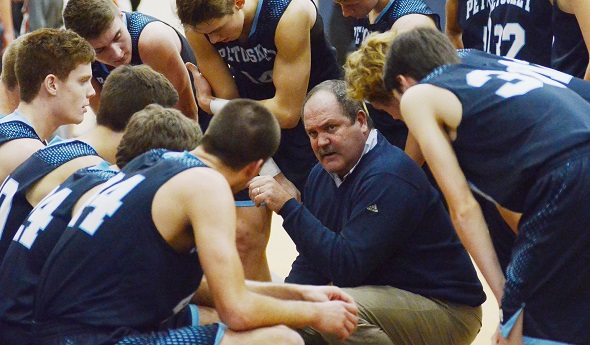
Starkey's Petoskey Ready to Shine Again
December 15, 2017
By Dennis Chase
Special for Second Half
PETOSKEY – Dennis Starkey remembers it like it happened yesterday.
Thirty-five years ago, at the age of 23, Starkey made his varsity head coaching debut with the Boyne City Ramblers.
 “The first game I coached was against the legendary Charlie Paige (Harbor Springs),” Starkey recalled. “I got it handed to me pretty good. I knew I had a long way to go after that ballgame.”
“The first game I coached was against the legendary Charlie Paige (Harbor Springs),” Starkey recalled. “I got it handed to me pretty good. I knew I had a long way to go after that ballgame.”
Starkey learned quickly. Now, starting his 31st season as coach of the Petoskey Northmen, the 58-year-old is among the winningest coaches in MHSAA history. His 536 career wins rank 18th all-time among boys coaches – with an average of nearly 16 wins a season.
Starkey should move up that list in the coming weeks as the Northmen appear poised for a promising winter.
Petoskey opened the campaign by capturing its Tip-Off Classic last weekend, beating Marquette 55-38 and Manton 66-57. Marquette won 20 games a year ago, while Manton was a Class C semifinalist.
“It’s a great start,” Starkey said. “We played two good teams. We have a lot of work to do, but we’re excited. This is a good group. These guys were really committed during the offseason. Hopefully, that will pay dividends.”
Petoskey was an uncharacteristic 12-8 a year ago. That squad was comprised of three seniors and nine juniors – and one of the key juniors, 6-foot-9 center Danny Kolp, was recovering from knee surgery.
“I’ve always said you win and lose with seniors,” Starkey said. “Our inexperience really showed last year. Luckily, we’re loaded with seniors this year. We’re hoping to get back to where we were before.”
The Northmen were 20-2 two years ago.
Motivation should not be a problem.
“We were pretty unhappy with how we did last year,” senior Joel Wilson, a two-year starter, said. “I expect a lot from this team.”
So does Kolp.
“(High school) memories last forever, and we want to make this a memorable senior season,” he said. “We want to reach our full potential. We have a high ceiling.
“We have the athleticism and skills to make a run in the tournament,” he added. “That’s our goal. Petoskey hasn’t been to a Regional (since 2012). We have a good chance to do it this year if we keep playing as a team.”
Petoskey, which returns four starters, put its size and balance on display last weekend. Seth Mann, a 6-5 guard, averaged 17 points in the two wins. Kolp, who has signed with Northwood University, came up big in the paint, averaging 16 points, six rebounds and two blocks. The athletic 6-4 Wilson contributed 13 points a game, and 6-5 Jake Lee 9.5 points. All are seniors, as is starting point guard Collin Kingma.
Petoskey not only used its length to its advantage – especially defensively and on the boards – but played with a focus.
“I think the biggest improvement thus far is mental,” assistant coach Kevin Starkey, Dennis’s son, said. “Even coach Hiller (Ryan Hiller at Manton) told me after watching the Marquette game that the guys looked locked in, ready to go. It’s visibly noticeable.”
Dennis Starkey started this season much like he has the previous 34, preaching a “team first” approach. From there, he addressed the standards his program is built on.
“It starts with being good students, good citizens,” he said. “If you have to fight issues that do not involve basketball, then you’re never going to be successful (on the court). Our guys have bought into a system that starts with everyone playing together, playing the way we expect and acting the way we expect.”
Starkey asks that his players, especially his seniors, take ownership of the team. As a reminder, after each practice, the coaches step away as the players huddle on the court to dissect that day’s effort.
“The one thing I’ve always enjoyed about coach Starkey is that he emphasizes it’s our team and we can make it how we want to make it,” Kolp, a three-year varsity veteran, said. “We’re not going to be as good if he’s the only one barking at us. He holds us accountable, and we enjoy that challenge.”
“He likes to say we’re all coaches on the court, that we should be coaching and learning from each other,” Wilson added. “He stresses that every day.”
It helps, of course, to have a team that’s already tightly woven. The seniors on this team have been playing basketball together since fifth grade and are “buddies” off the court.
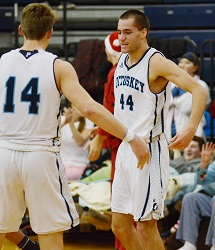 On the court, Starkey clearly sets the tone, though.
On the court, Starkey clearly sets the tone, though.
“He’s not afraid to get in your face,” Wilson said. “He pushes you hard. But it’s all for the better.”
Petoskey has long been noted for producing disciplined, fundamentally-sound teams. That’s Starkey’s style.
“We try to play up-tempo as much as we can,” he said. “But we really rely on executing offensively and defensively in the half court.”
It’s an approach that runs deep in the system. Sean Pollion, Matt Tamm and Jason Miller all have 20-plus years coaching high school basketball at the school. Pollion is an assistant to Starkey, Tamm is now the JV coach while Miller just moved over to the girls program. In addition, Kevin Starkey and Jon Flynn, a star on the school’s two Class B Semifinal teams in the late 1990s, are assisting.
“That continuity means so much in high school basketball,” Dennis Starkey said. “Some programs have a hard time keeping coaches for extended periods. It’s been an advantage for us. It’s paid dividends.”
Starkey started honing his skills at Boyne City, serving a one-year apprenticeship under Bob Taylor, who went on to coach in the Great Lakes Intercollegiate Athletic Conference. He replaced Taylor, who took the Lake Superior State women’s job, and then left Boyne City after a season to accept a head coach/athletic director position at Vanderbilt. It was there he met his wife, Karen. After three years, Starkey moved on to Petoskey. To this day, former longtime Petoskey athletic director Gary Hice calls it one of the best decisions he ever made.
Inducted into the Basketball Coaches Association of Michigan Hall of Fame in 2014, Starkey has coached teams that have won 17 Districts and four Regionals.
His 1996-98 squads featured guards Trevor Huffman, who later led Kent State to an Elite 8 NCAA Tournament appearance in 2002, and Flynn, Grand Valley State’s all-time leading scorer (2,220 points).
Starkey would later coach his sons, Kevin and Cory. Cory, who went on to earn all-state honors, played at Bucknell and then a year professionally in Ireland. After earning his master’s degree in international finance, Cory accepted a job with an investment company in Chicago. His boss? Former Charlevoix basketball standout Scott Friske, now a senior vice president at First Trust. Friske and Petoskey’s Damon Huffman, Trevor’s younger brother, were teammates at Brown. Another former Charlevoix Rayder, Jared Hunt, also works at First Trust.
“Basketball opened a door for (Cory) in the business world,” Dennis Starkey said. “He’s been blessed. When you’re involved in this sport, you have so many contacts. And a lot of the northern Michigan guys look after each other. It’s a real special bond they create, all because of high school basketball.”
But the story is not over. Trevor Huffman is also in Chicago and lives with Cory. Huffman is still involved in basketball.
“He’s using basketball as an adult workout platform,” Starkey said. “He has guys come in and they do drills, much like we do in practice. So instead of going to the gym and lifting weights and doing cross-training, his clients, most of them former players, use basketball as a form of exercise to become more fit.”
After graduating from University of Michigan, Kevin Starkey headed back north and took a teaching/coaching job at Manton, serving as an assistant to Hiller. The Rangers first game that season? Petoskey.
“That was bizarre, coaching against my dad,” Kevin admitted.
When Dennis Starkey retired as a physical education teacher, Kevin Starkey was hired to replace him. He’s now in his third year at the school.
It’s given Kevin a unique perspective on his dad. He played two years for him on varsity (2007-08 and 2008-09) and has now coached with him three years. When asked if he has a favorite story that encapsulates the type of person his father is, Kevin doesn’t have to think long.
“My senior year we were playing Charlevoix and I had just recently broken my hand,” he said. “It was my first game back. We didn’t know what to expect. When the game started, they were sagging off me because (the injury) was to my shooting hand. When I put up that first shot, I hit it. Then, all of a sudden, I hit five 3s in the first half. He never lets it go. It’s something I remember because he was so proud of me. It was my last (home) game and I was just trying not to air-ball it. Somehow, a few of them went in.
“Well, the next year when I came home from college – we sometimes watched old game films, or films of us growing up – he puts that game in first. He was like, ‘Man, that was so cool.’ I say that not because I need credit, but it was one of those things where he was more excited than I was for myself.”
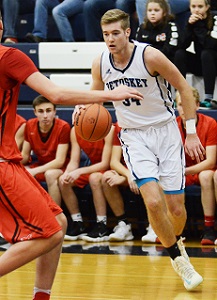 That, Kevin added, is how Dennis is with his players. He wants the best for them.
That, Kevin added, is how Dennis is with his players. He wants the best for them.
This team is no exception.
Kolp, who has had two knee operations, is finally healthy. His last surgery was in June of 2016, and he missed the first six games a year ago.
“He really wasn’t himself - until now, to be honest,” Starkey said.
In eighth grade, Kolp landed awkwardly on his right leg, tore a ligament and dislocated his kneecap.
“They couldn’t do the full operation because I was still growing,” he explained. “Two years later I blew it out again.”
Kolp, who plans to go into an entrepreneurial program at Northwood, spent this past offseason working hard in the weight room.
“I was in there five days a week, lifting to improve my upper and lower body,” he said. “Now, during the season, I’m in there two to three times a week to maintain my strength. I feel good. Everything is coming together.”
Wilson, all agree, is the most athletic player on the squad. He was a first-team all-Big North Conference pick as a quarterback and outside linebacker in football. Several colleges have expressed interest, and he is visiting Central Michigan this weekend and will miss Saturday’s game with Zeeland East. Central Michigan is recruiting him as a preferred walk-on with plans to use him at tight end.
“It’s (disappointing) to miss the game, but I have a decision to make that will (affect) the next four years of my life,” he said.
Mann is the team’s top perimeter shooter.
“Seth is a skilled shooter,” Starkey said. “He has good size and length. I think he’s going to have a great year.”
Kolp agrees.
“With our size, if we get it into the post, and (opponents are) starting to play help defense from the backside, and Seth is in the corner, he’ll punish them for it,” he said.
It could be a special season.
Starkey, though, is not one to think too far ahead. He said the best advice he ever received was to “live in the moment, coach in the moment.”
And he knows there will be challenges ahead. There are no guarantees.
“As excited as I am with all the guys we have back, every coach in the league feels the same way,” he said. “Last year there was only one senior on the first and second all-conference team. It’s going to be a very good race.”
As for the future, Starkey, who credits a strong support system at home for his success, is not saying how much longer he’ll coach.
Kevin has an opinion, however.
“It’s something he’s really good at,” Kevin said. “I look at it like this: Don’t throw it away if you’ve still got it.”
 Dennis Chase worked 32 years as a sportswriter at the Traverse City Record-Eagle, including as sports editor from 2000-14. He can be reached at [email protected] with story ideas for Manistee, Wexford, Missaukee, Roscommon, Ogemaw, Iosco, Alcona, Oscoda, Crawford, Kalkaska, Grand Traverse, Benzie, Leelanau, Antrim, Otsego, Montmorency, Alpena, Presque Isle, Cheboygan, Charlevoix and Emmet counties.
Dennis Chase worked 32 years as a sportswriter at the Traverse City Record-Eagle, including as sports editor from 2000-14. He can be reached at [email protected] with story ideas for Manistee, Wexford, Missaukee, Roscommon, Ogemaw, Iosco, Alcona, Oscoda, Crawford, Kalkaska, Grand Traverse, Benzie, Leelanau, Antrim, Otsego, Montmorency, Alpena, Presque Isle, Cheboygan, Charlevoix and Emmet counties.
PHOTOS: (Top) Petoskey coach Dennis Starkey huddles with his team during the season-opening Tip-Off Classic. (Middle) Joel Wilson (14) and Jake Lee share a celebratory moment. (Below) Senior Danny Kolp pushes the ball upcourt during the event. (Photos courtesy of the Petoskey News-Review.)
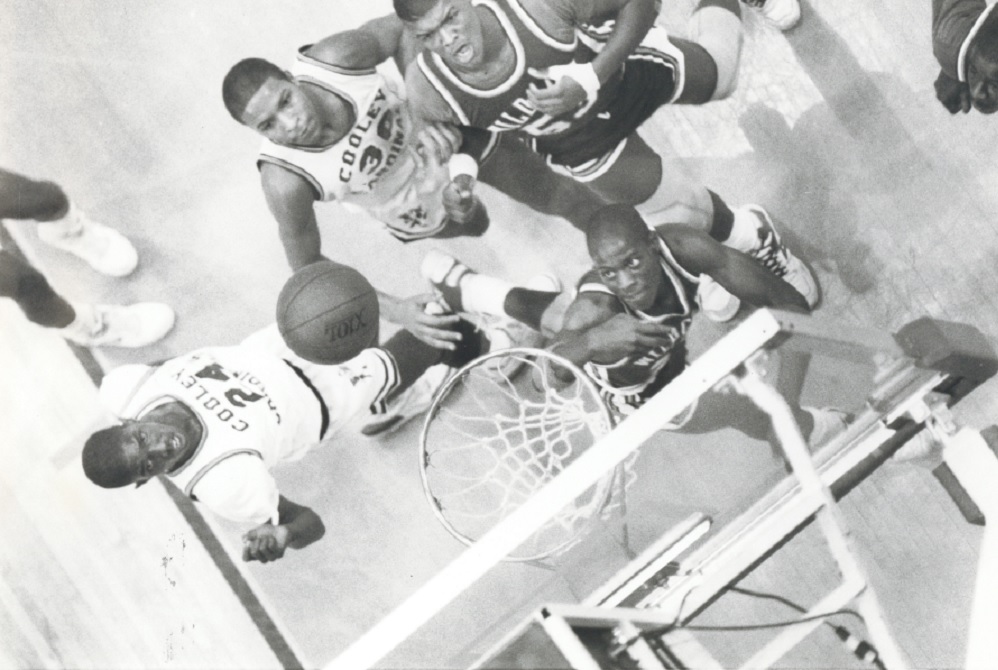
1970-1995: Detroit, Flint Ruled Class A Boys Basketball
By
Ron Pesch
MHSAA historian
March 7, 2022
Geographic domination.
It really hasn’t happened on the basketball court in the MHSAA’s top classification since the mid-1990s.
Class A state titles – designated Division 1 in basketball since 2019 – have bounced around Michigan over the last 25-plus years like, well, an over-inflated wayward basketball. Kalamazoo Central, Pontiac Northern, and Clarkston grabbed back-to-back titles between 1996 and 2021. The Saginaw area locked down five Class A crowns within that stretch; Arthur Hill snagged one in 2006, while Saginaw High immediately followed with two in a row in 2007 and 2008. The Trojans also won in 1996 and 2012. Greater Lansing has three titles – one by Lansing Everett, another by Lansing Waverly, then one by Holt High School – about eight miles outside the city limits.
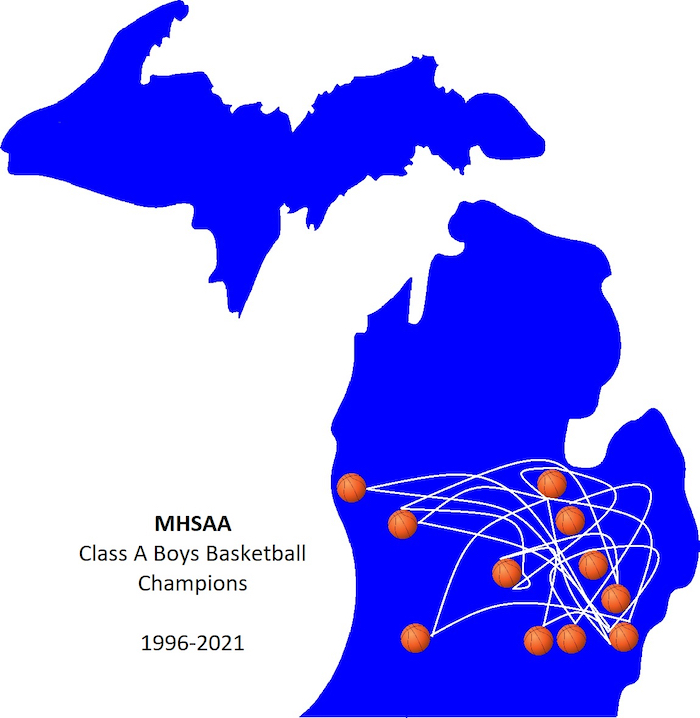 Then it’s single titles to Grand Rapids Ottawa Hills, Rockford, Muskegon, Ann Arbor Pioneer, and Ypsilanti Lincoln. Metro Detroit schools Romulus, Pershing, Central, Western, and U-D Jesuit also have single championships during that span.
Then it’s single titles to Grand Rapids Ottawa Hills, Rockford, Muskegon, Ann Arbor Pioneer, and Ypsilanti Lincoln. Metro Detroit schools Romulus, Pershing, Central, Western, and U-D Jesuit also have single championships during that span.
But from 1970 to 1995, a trip to the Finals to watch the ‘A’ title game meant – with rare exception – you were watching a team from Flint or Greater Detroit. Or both.
Flint: Home of the Vikings
Opened in the fall of 1928, Flint Northern had been the Vehicle City’s top basketball school, winning Class A titles in 1933, 1936, 1939, and 1940 under coach Jim Barclay, then another in 1947 under Les Ehrbright. The Vikings also advanced to the state championship game in 1954 under Carl Stelter, losing to Muskegon Heights in overtime, 43-41.
Then, things went mostly quiet for the next decade and a half.
Jack Marlette was only the fourth varsity basketball coach in school history. Since arriving at Northern in 1949, he had served as head coach in tennis and golf, sophomore coach in basketball and football, junior varsity coach in basketball and football, equipment manager, and head trainer.
Midseason 1955, he replaced Stelter as the varsity basketball coach, when Stelter was named a principal within the Flint school district.
“Marlette coached teams posted a record of 112 victories and 99 defeats,” stated Len Hoyes in the Flint Journal when the coach stepped down in March 1967. “Included are six city championships, two districts, and a Saginaw Valley Conference crown in 1956.” His 1957 team reached the MHSAA Quarterfinals, losing to East Detroit.
With the announcement, Northern wooed 36-year-old Dick Dennis to take his spot come the 1967-68 season. Dennis’ teams had posted an impressive 105-21 varsity record at Alpena High School over seven seasons. Perhaps more impressively, his teams had beaten two of the Flint area’s finest in the MHSAA Regional round in 1966.
Dennis agreed to the move to Northern, “but had one important request,” stated reporter Bruce Johns in the Journal. “He wanted Bill Frieder as the junior varsity coach.”
Frieder, who would ultimately become a legendary basketball figure in Michigan, had landed his first basketball job as JV coach under Dennis at Alpena during the 1965-66 school year.
“… (A) son-in-law of Larry Laeding, former Saginaw High coach and a former player for the Trojans, Freiders (sic) had a 20-11 JV record for two years,” noted the Journal at the time of the hiring. (Laeding’s Saginaw team had won the Class A basketball championship in 1962.)
Dennis’ varsity squad posted an 11-6 record that first year, followed by a 13-6 mark in 1968-69, the program’s best season in 10 years. Frieder’s 1967-68 JV Vikings finished with a 13-3 mark, earning a share of the Saginaw Valley Conference’s title. In his second year, Frieder’s squad went a flawless 16-0.
But a teacher’s strike in Flint the following school year caused Frieder to resign from his position.
“At this point, I want to emphasize that I am highly opposed to teachers’ striking as I feel it sets a poor example for children and such an act reflects upon me personally,” stated Frieder in a letter of resignation to the Flint Board of Education.
Unable to work around it, he stepped aside.
Another shake-up
After three seasons at the helm, in May 1970, Dennis accepted an assistant principal position within the district. Northern administration interviewed nine “capable” candidates for the opening, including the former JV coach.
“Out of the candidates, we felt that Bill was the best qualified,” Northern athletic director Jim Fowler told the Journal’s Dean Howe 22 days later. “Bill is familiar with our situation at Northern, he’s familiar with the kids and unquestionably a fine coach.
“… it was Dennis’s strong recommendation that finally swung the gavel Frieder’s way,” stated Howe.
“Bill has a tremendous ability to get along with the kids,” Dennis had told the Journal in 1969. “… there are some coaches who never accomplish this. Bill’s two outstanding characteristics are his loyalty to the job and kids and his tremendous amount of pride.
“He just loves the game. Bill works just as hard at developing good citizens as he does to winning.”
Under Frieder, the Vikings quickly returned to the state spotlight, winning two straight MHSAA Class A championships in 1971 and 1972.
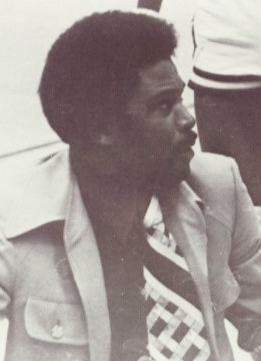 For the first time since 1954, Northern enjoyed final round success. Frieder’s 1971 Vikings, powered by senior Tom McGill and the Britt brothers, Wayman and James, clipped the taller – and favored – crew from Detroit Kettering, led by Lindsay Hairston, 79-78.
For the first time since 1954, Northern enjoyed final round success. Frieder’s 1971 Vikings, powered by senior Tom McGill and the Britt brothers, Wayman and James, clipped the taller – and favored – crew from Detroit Kettering, led by Lindsay Hairston, 79-78.
A year later, Frieder’s team beat Pontiac Central, a squad it had defeated twice during the regular season, 74-71. It was the Vikings’ 33rd-straight victory.
Frieder returned for the 1972-73 season. The Vikings posted an 18-7 record and won a District title. In July, his JV coach from the past two seasons, Grover Kirkland, was named head basketball coach at Flint Northwestern. In August, Frieder resigned. Rumors had been flying that he might go to the University of Michigan as an assistant. A Saginaw native, Frieder stated his “retiring is a result of many things.” Primarily, he planned to return to Saginaw to go into the produce business with his father.
The rumors, it turned out, were true. A little over a month later, the University of Michigan appointed Frieder as assistant basketball coach.
“We think it’s very fine to have a man of Bill’s caliber on our staff,” said Johnny Orr, Michigan’s head men’s basketball coach.
“If at this point in my life, I could describe the job I wanted most, the thing I wanted most to do in my life, this would fit it to a tee,” said Frieder at the time of the announcement.
Bill Troesken, 29, who had stepped down in June of 1973 after three years as varsity coach at Flint Powers Catholic, was hired by Northern to replace Frieder. His team would grab another Class A championship in March 1978.
A Long Drought
Flint’s oldest high school, Flint Central, was opened in 1875. Incredibly, the boys basketball team never won a state title – or even appeared in a championship game – until coach Stan Gooch arrived on the scene.
“Gooch, who starred in basketball at Flint Tech High, Flint Junior College, and Central Michigan (University), began his coaching career as bench boss of the sophomore team at Central High in 1959,” recalled Brendan Savage for MLive in 2008 at the time of his induction into the National High School Athletic Coaches Association Hall of Fame. “He took over the reins of the junior varsity the following year and was promoted to varsity coach in 1966.” Gooch guided Flint Central to its first state championship game in 1967, but Central was trounced by Detroit Pershing, a PSL squad considered by many to be the greatest basketball team in Michigan prep history. Guided by coach Will Robinson, the Doughboys were led on the court by future NBA players Spencer Haywood and Ralph Simpson.
Gooch resigned following the 1967-68 season to become head coach at Flint Junior College (which was converted into a countywide college, and rebranded as Genesee Community College in 1969, then renamed Mott Community College in 1973). After 10 seasons, Gooch stepped down, and within months, he replaced his replacement at Flint Central, Clif Turner, who had guided the program through the 1977-78 season.
Central then won three straight Class A titles from 1981-83, helping to build the legend of Flint basketball.
Then it was Northwestern’s turn. In both 1984 and 1985, Coach Kirkland’s Wildcats beat Detroit Southwestern. With those wins, the Flint city schools had now won six of the last eight titles.
“City of Champions defies explanation” trumpeted the Journal at the end of March 1985, after Northwestern had won Class A and Flint Beecher had won the boys title in Class B.
“No single factor can be pinpointed as the reason Flint has dominated,” wrote Phil Pierson under the headline, “while metropolitan Detroit, an area approximately 10 times larger, has failed to win a Class A Championship since 1979.”
Northwestern’s Glen Rice “became the area’s first recipient of the Mr. Basketball award presented by the Michigan High School Basketball Coaches Association and has been named to the Parade and Basketball Weekly All-American teams. (Beecher’s Roy Marble finished second, while Central’s Terence Greene finished fourth in Mr. Basketball balloting).
Was this success the opportunity to play year-round, asked Pierson. Coaching? The talent on the court?
Other areas across the state featured these same strengths, concluded the writer. “It may just be that the reason for Flint’s success is too obvious to be considered by the philosophers: the cyclical nature of high school sports.
“There was nothing wrong with Flint basketball from 1948-70 when there were no state Class A or B championships. Other teams and programs were just better.”
The Return of the PSL
It took five years after the return to the MHSAA Tournament before the PSL earned a Class A title with that ’67 Pershing squad. The next arrived in 1970, again by Pershing, then in 1973 by Southwestern, and again in 1979 by Mackenzie. Class A was won by Metro Detroit in 1974, by Birmingham Brother Rice, in 1975 by Highland Park, and in 1976 by Detroit Catholic Central.
From 1971 to 1985, Flint’s public school champions had defeated Pontiac Central twice, and PSL teams from Kettering, Murray-Wright, and, famously, Southwestern, on four straight occasions between 1982 and 1985.
On only two occasions between 1975 and 1995 did the Class A crown leave the city of Flint or Metro Detroit. In both instances, it landed in Lansing. In 1977, the Lansing Everett Vikings, led by Earvin Johnson – nicknamed “Magic” by the press – wrestled it away by downing Brother Rice in a 60-56 overtime thriller. In 1980, Lansing Eastern, powered by the state’s first Mr. Basketball winner, Sam Vincent, did the same, with a 64-53 victory over Highland Park.
The Cycle of Basketball
As soon as the ink dried on Pierson’s words, it seems, the cycle rotated.
Romulus took down Southwestern in ’86 before the PSL took control of Class A beginning with the 1987 season. Cooley, coached by Ben Kelso, snagged the first of three straight that year. After finishing as runner-up in seven of the previous eight title games, Southwestern, coached by Perry Watson, grabbed back-to-back victories in ’90 and ’91. Coach Johnny Goston’s Pershing teams beat Benton Harbor for consecutive titles in 1992 and 1993. Then Murray -Wright, coached by Robert Smith, captured its first crown in 1994.
On four of the eight occasions between 1987 and 1994, the Class A game featured an all-PSL card.
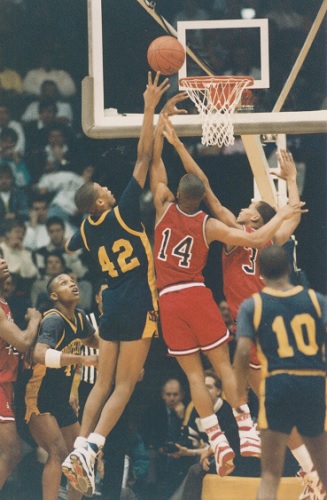 The 1995 Class A final wrapped the amazing run as No. 1-ranked Flint Northern, powered by Mateen Cleaves’ game-leading 28 points and Antonio Smith’s 24 points and 15 rebounds, decimated No. 2 Pershing, 86-64 before a crowd of 11,179 at the Breslin Center. Northern had trailed 44-37 at the half.
The 1995 Class A final wrapped the amazing run as No. 1-ranked Flint Northern, powered by Mateen Cleaves’ game-leading 28 points and Antonio Smith’s 24 points and 15 rebounds, decimated No. 2 Pershing, 86-64 before a crowd of 11,179 at the Breslin Center. Northern had trailed 44-37 at the half.
It was Northern’s first title since 1978. It would also be the program’s last. The introduction of “school of choice” in Michigan in 1996, combined with plunging birth rates in the U.S. that peaked in 1978, meant upheaval in enrollment across the state’s public schools. In Flint, declining enrollment – also impacted by the pending closure of a massive automotive manufacturing complex operated by General Motors known as “Buick City” – forced the closure of Central following the 2008-09 school year. Northern closed in 2013. Following the 2017-18 school year, Northwestern and Flint Southwestern merged, leaving Southwestern as the city’s lone high school.
In Detroit, Northern, Mackenzie, and Murray-Wright were among four high schools closed by the Detroit Public Schools in 2007 due to cost constraints and declining enrollments. Cooley was shuttered in 2010. Southwestern, dedicated in 1922, and Kettering, opened in 1965, both closed in 2012.
Of the 26 Class A title games waged between 1970 and 1995, Flint City Schools and the PSL teams each won nine of those contests. On 15 occasions, the championship game featured a match-up of Flint and Detroit PSL teams. On only seven occasions did schools from outside Wayne, Oakland, or Genesee counties ever crash the championship party. Saginaw High School ended with runner-up honors in 1973, 1976, and 1990, with Lansing and Benton Harbor High Schools being the only others.
Parade of Talent
Basketball junkies attending title games during those years watched an incredible collection of talent come out of those teams from Flint, the PSL and metropolitan Detroit during the span.
On the coaching side:
► Frieder ended up as head coach at Michigan with the 1980-81 season, then Arizona State in 1989.
► Gooch compiled over 400 varsity wins and 86 JV victories during his time at Flint Central.
► Kirkland ended his basketball coaching career in 2000 as Flint’s all-time winningest varsity coach, compiling a 518-148 mark. His Wildcats compiled 60-straight wins between January 1984 and February 1986 and presently rank No. 3 in consecutive wins in state history. In 2020, Detroit Free Press writer Mick McCabe named Northwestern’s 28-0 team from 1985 as the greatest boys basketball team he covered in his 50 years of reporting.
► Southwestern’s Watson served as an assistant at Michigan for two seasons, then guided the men’s basketball team at the University of Detroit Mercy from 1993 to 2008, compiling a 258-185 record over 15 seasons.
► Kelso, a Flint Southwestern graduate who did not play high school basketball but ended up as the all-time scorer at Central Michigan when he graduated in 1973, would be a finalist for the head coaching spot at CMU in 1997. At Cooley from 1984 through 1998, he later served as an assistant basketball coach at Kansas State in 2005-06.
► Kettering’s Charles Nichols, on hand since the school opened, coached tennis, football, and track during his first years at the school. With the 1970-71 season, he took over basketball coaching duties from Walt Jenkins, guiding the team for four campaigns. In December 1974, he joined Dick Vitale’s coaching staff at the University of Detroit for parts of two seasons. He returned to Kettering in 1978 as athletic director, then later served as assistant director of the PSL until his retirement in 2002.
The players included:
Flint
► Central’s Eric Turner, Marty Emery, Mark Harris, Keith Gray, Terence Green, and Darryl Johnson.
► Northern’s Terry Furlow, Dennis Johnson, Gary Pool, Antonio Smith, and Mateen Cleaves.
► Northwestern’s James Person, Jeff Grayer, Glen Rice, Andre Rison, Anthony Pendleton, and Daryl Miller.
Detroit PSL
► Cass Tech’s Tony Jamison and William Mayfield.
► Cooley’s Yamen Sanders, Earl Stark, Rafael Peterson, Michael Talley, and Daniel Lyton.
► Kettering’s Lindsay Hairston, Joe Johnson, Eric Money, and Coniel ‘Connie’ Norman.
► Mackenzie’s Steve Caldwell and Dave Traylor.
► Murray-Wright’s Willis Carter and Robert Traylor.
► Northern’s Katu Davis and Leonard Bush.
► Pershing’s Phil Paige, Robert Hawkins, Calvin Harper, Willie Mitchell, Carlos Williams, Todd Burgan, and Winfred Walton.
► Southwestern’s Darryl Robertson, Antoine Joubert, Clarence Jones, Sam Sillmon, Tarence Wheeler, Anderson Hunt, Loren Clyburn, James Hunter, Jalen Rose, Voshon Lenard, and Howard Eisley.
Metro Detroit
► Birmingham Brother Rice’s Will Franklin, Kevin Smith, and Tim Andree.
► Detroit Catholic Central’s Mike Prince and David Abel.
► Highland Park’s Terry Duerod, Percy Cooper, and Renardo Brown.
► Pontiac Central’s brothers Campy, Larry and Walker D. Russell; Larry Cole, Tim Marshall, and Clyde Corley.
► Romulus’s Terry Mills, and Stevie Glenn.
 Ron Pesch has taken an active role in researching the history of MHSAA events since 1985 and began writing for MHSAA Finals programs in 1986, adding additional features and "flashbacks" in 1992. He inherited the title of MHSAA historian from the late Dick Kishpaugh following the 1993-94 school year, and resides in Muskegon. Contact him at [email protected] with ideas for historical articles.
Ron Pesch has taken an active role in researching the history of MHSAA events since 1985 and began writing for MHSAA Finals programs in 1986, adding additional features and "flashbacks" in 1992. He inherited the title of MHSAA historian from the late Dick Kishpaugh following the 1993-94 school year, and resides in Muskegon. Contact him at [email protected] with ideas for historical articles.
PHOTOS (1) Detroit Cooley's Rafael Peterson (24) and Benson Maurice match up with Flint Northwestern's Archie Munerlyn (53) and Reggie Richardson during the 1988 Class A Final. (2) The Class A/Division 1 championship has been won by teams across the southern half of the Lower Peninsula over the last 25 years. (3) Grover Kirkland, here in 1975, built Flint Northwestern into a power. (4) Detroit Southwestern's Jalen Rose (42) and Cooley's Michael Talley (14) work to grab a loose ball during the 1989 Class A Final. (Photos courtesy of the Detroit News [1] and Gary Shook [4], or collected by Ron Pesch.)

